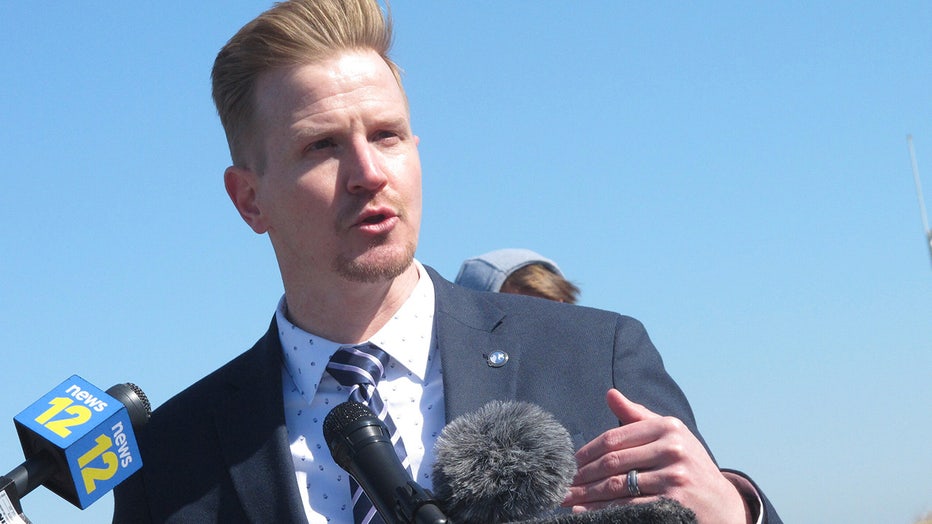Belgium-based Solvay to pay $393M to clean up and compensate for PFAS contamination in New Jersey
Shawn LaTourette, New Jersey's environmental protection commissioner, speaks at a news conference in Middletown N.J. on March 8, 2021. (AP Photo/Wayne Parry)
TRENTON, N.J. - A Belgium-based chemical company will spend nearly $393 million under a settlement announced Wednesday to clean up contamination from its so-called forever chemicals in New Jersey's drinking water and soil and to compensate for the environmental damage they caused.
Solvay Specialty Polymers USA, LLC reached a legal settlement with New Jersey's Attorney General's Office and Department of Environmental Protection on contamination at and near its West Deptford plant in southwestern New Jersey near Philadelphia.
The state had been suing Solvay and numerous other companies to force them to clean up contamination with per- and polyfluoroalkyl substances, collectively known as PFAS chemicals. The substances are commonly referred to as "forever chemicals" because they never break down and are difficult to remove from water and soil, said Shawn LaTourette, New Jersey's environmental protection commissioner.
These substances can harm fetuses and newborns and have been associated with kidney and testicular cancer and other illnesses.
They have been used for more than 60 years and have become staples of modern life for consumers who want to protect their clothing from stains or water, and prevent food from sticking to cookware. They have been used in brands such as Stainmaster, Scotchgard, Teflon, Gore-Tex, and Tyvek, according to the environmental department.
"For years, corporations including Solvay have put financial gain over our clean drinking water and the health of millions of people," said Attorney General Matthew Platkin.
New Jersey has been pursuing numerous other companies since 2019 for similar contamination. Those cases remain in litigation, and LaTourette acknowledged the problem goes far beyond the actions of one company.

On June 28, 2023, he and the state's attorney general, Matt Platkin, announced a settlement with Solvay Specialty Polymers in which the company will spend nearly $393 million to address contamination from so-called "forever chemicals" at its facility
Mike Finelli, Solvay's chief North America officer, said the settlement allows "all parties to continue focusing on cleaning the environment."
He said the company has been investigating and remediating PFAS at its West Deptford site since 2013, including working with the town to install a drinking water treatment system on a municipal well; installing a cap at Solvay’s facility to stop contamination from spreading; constructing and operating an offsite groundwater pump-and-treat system, and enhancing on-site groundwater treatment systems.
Finelli said the company's products are used in a range of applications including lithium-ion batteries, components for compact engines in hybrid vehicles, medical device components, and smart devices.
For more than 30 years, Solvay’s West Deptford site manufactured industrial plastics, coatings, and other chemicals across the Delaware River from Philadelphia International Airport.
The settlement obligates Solvay to clean up contamination in and around its site, work with the state to limit ongoing discharges, and test for contaminants in public and private water sources in the area.
Featured
Opened amid uncertainty, Atlantic City's 2 newest casinos near top of the market 5 years later
The two newest casinos in Atlantic City are among the most successful.
The company will pay $214 million to guarantee that the environmental department will have money to complete the cleanup should Solvay fail to meet its obligations. It also will pay $100 million to address PFAS impacts to drinking water or private wells in over a dozen communities.
Solvay also must spend $75 million to compensate the public for damage to natural resources, and $3.7 million to reimburse the environmental department for its enforcement efforts in the case.
Environmental groups reacted cautiously to the settlement, saying its many details need to be studied.
"The communities in the Delaware River region that have been indelibly harmed by Solvay and the highly toxic contamination they unleashed have suffered terribly and need to benefit directly from whatever settlement is reached between" the environmental department and Solvay, said Tracy Carluccio, deputy director of the Delaware Riverkeeper Network.
"Polluters like Solvay should have the book and more thrown at them for what they have done," added Goldsmith.
Bill Wolfe, a former environmental department official and longtime critic of the agency, said much of the payments Solvay will make are required under existing environmental department regulations and should not be considered an outcome of litigation.
The Associated Press contributed to this report.


